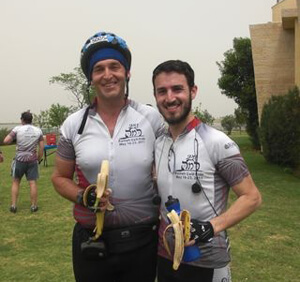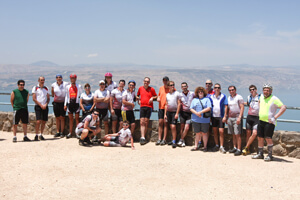Original article published in the Jerusalem Post
The Ramah Bike Ride and Hiking Trip: Five days through the Golan Heights in support of the camp’s Tikvah disabilities inclusion programs.
When Timna Rockman completed the course to become a certified tour guide, she assumed she would be sharing her love of Israel with tourists from around the world. Instead, she found herself delivering fast food for the well-known Finnish-based Wolt food-delivery company.
In the process of delivering food on her traditional, non-pedal-assist bike, she got into better shape and decided to begin offering personal training services to students near the Ben-Gurion University campus in Beersheba. She held out hope that she would one day return to tour guiding.
As tourists have begun to return to Israel, Rockman found a way to incorporate all of her strengths and interests. She recently spent five days guiding bikers through the Golan Heights as they participated in the Ramah Bike Ride and Hiking Trip, in support of the camp’s Tikvah disabilities inclusion programs.
Ramah and the trip
Ramah is a network of summer camps in the US, Canada and Israel, founded in 1947. Tikvah, founded in 1970, provides meaningful camp experiences for children, teens and young adults with disabilities. The Golan and Galilee Ride and Hike, which took place in May for the sixth time, started as a bike ride-only event in 2011. It has expanded to offer participants a logistically complex smorgasbord of choices that includes three levels of bike riding, two levels of hiking, guides, medics, mechanics, bus drivers and many volunteers.
Due to the pandemic and frequent border closings, the Ramah event had been rescheduled several times. Other charity bike rides in Israel have also been postponed and rescheduled rides due to the pandemic. Both Alyn Hospital’s Wheels of Love cycling event and Hazon’s Israel Ride benefiting the Arava Institute and Hazon, are scheduled to take place in November 2022.

Ramah’s 150 riders and hikers were happy to not wait until November to come to Israel. It has been a long time since most had been to Israel, been on vacation or flown at all. Ethan Corey, a returning hiker, and parent of two children who have participated in the Tikvah Program at Camp Ramah in New England, had hoped to come to Israel in March, 2020 but his trip was canceled due to the pandemic.
“Over the past two years, seeing Israel closed to non-Israelis was very frustrating,” he says, and is thrilled to be back. “Compared to the US and the northeast, it feels is if people are past COVID. There are no masks on the trains, in the stores or on the streets.
“As I walk down the streets, I close my eyes and think back to the pre-COVID days. It is nice to hear Hebrew and to walk down the streets and see a minyan meeting in a Jerusalem playground,” he adds. “It is a good feeling being in a place where being Jewish is a normal state of affairs.”
“Being in Israel is coming home!” says Josh Charlat, a dentist and board president of Camp Ramah in Canada who last visited Israel in 2019. “I would have been here sooner – when my daughter was here in seminary,” notes Charlat. “It was a challenge as a North American parent not seeing a child for so long, but being here keeps Israel at the top of my mind.”
“It was a challenge as a North American parent not seeing a child for so long, but being here keeps Israel at the top of my mind.”
Josh Charlat
Michael Bodner was last in Israel three years ago to visit his daughter. He reports that three previous trips he had planned to Israel were canceled. “Now I’m finally here. It is great to be back in Israel!” Bodner attended the Camp Ramah in Nyack day camp in 1963. Being on a trip will fellow lovers of Ramah helped him relive his camp days and recall the lyrics to the musical Porgy and Bess which he performed in Hebrew as a camper.
Mark Meskin of California has traditionally been a frequent traveler to Israel to visit a daughter and her husband, and their two grandchildren in Jerusalem. He was one of the lucky ones to visit Israel during the pandemic when first-degree relatives were permitted to apply to travel to Israel. The four-time biker-turned-hiker visited and hiked in nearly a dozen US national parks during the pandemic. He has welcomed the opportunity to again hike in Israel.
“I have personally been a lover of nature, and until Ramah did this physically challenging fundraiser, I had no ideas how diverse nature is in Israel,” he says.
“I have personally been a lover of nature, and until Ramah did this physically challenging fundraiser, I had no ideas how diverse nature is in Israel.”
Mark Meskin
He was struck by the “unbelievable amount of water” he had never witnessed before.” Meskin was referring to such sites as the Black and White waterfalls of Nahal El Al, the Banias springs and the Devora and Gilbon waterfalls.
He is pleased that, as COVID numbers go down, travel to Israel is more accessible. “I am thrilled it is getting easier!”
FOR SOME, like non-Jewish riders Charles and Michelle Smith from Philadelphia, this was their first Israel experience. Smith came with two Jewish bike-riding friends and playfully notes, “I was a little nervous when I learned some had been to Israel 20 or 30 times and it was my first trip.”
He and his wife spent a few pre-trip days exploring Jerusalem and Christian holy sites. After biking in the North, Smith had a better sense of, and appreciation for Israel.
“Biking on the Golan showed just how close Syria is. And the descent to the Sea of Galilee, and the chance to take a dip, were not the same as passing [the area] on a tour bus. It was refreshing spiritually and a change to take a break from pedaling!” he mused.
Participants ranged in age from 13 to mid-80s and included seven doctors, 10 rabbis, 17 lawyers, board members of various camps, a Tikvah participant from 1971 – the program’s second summer – and several parents of Tikvah participants.
Medic Chaya Ben-Yehuda, 24, of Givat Mordechai in Jerusalem, was pleasantly surprised by the group she escorted on the advanced and moderate hikes. “They said it was old people and I figured it would be short hikes!” she reports, referring to the overview of the group she was given when assigned to the Ramah group. She admits this couldn’t have been further from the truth.
“I was impressed with their hiking skills. You are all amazing!” she adds, impressed with the group’s willingness and ability to hike for eight or more hours per day.
At the final evening program of the trip, several camp directors, organizers and participants had a chance to share remarks. Debbie Albert, board president at Camp Ramah in Pennsylvania’s Poconos, noted: “This felt like a week at camp. We met new friends, challenged ourselves, prayed together, learned together, pished together, and formed new friendships that will last a lifetime.” Albert was playfully referring to the inevitable lack of bathrooms throughout the dozens of miles of hiking trails in the North.
Longtime Ramah hiking trip tour guide Dolev Arbaieter, who was pleased to return to guiding after a two-year hiatus, was fond of reminding the hikers that there are “thousands of bathrooms” all along the sometimes strenuous hiking routes. The good-natured Arbaieter, who occasionally brewed fresh coffee on the trail for his hikers, shared the fascinating history of such places as Tel Saki and such important figures as Eli Cohen, the Israeli spy who was caught in Syria and publicly hanged in 1965. He also provided a wealth of information about nature, geology, geopolitics and ancient synagogues throughout the five-day hike.
Fellow guide Ariel Lisman, owner of Finjan Travel, also lost business during the pandemic, but was able to guide students and new olim when mandatory lockdowns were lifted. He acknowledges how difficult it has been for the travel industry.
“Since June 2021, we have had no government support, so we are living off of our savings. Many lost money they had been saving for buying homes,” he says. Lisman concedes that “people in tourism are used to living life in the balance” and that tourism to Israel often fluctuates given periods of war and heightened tension. “It is nice to see things back!”
While guides are returning to work, actually finding a guide can be a challenge. Biker Marc Schlussel notes, “It was hard to find a guide for a tour in Jerusalem on a recent Friday. They were all booked!”
The tourism industry is indeed recovering, but it is very much in flux, according to Prof. Yaniv Poria at the Department of Hotel and Tourism Management in the Guilford Glazer Faculty of Business and Management at Ben-Gurion University. “Many tour guides had to find other jobs and were settled in elsewhere. When tourism started coming back, they felt the urge to return to guiding,” he observes. “Some are quitting those jobs to go back to guiding. They chose this lifestyle and love being with people and wanted to get back.”
He notes that other parts of the hospitality industry including hotels and airports are still having difficulties finding workers. “Even the high occupancy Hilton Tel Aviv is having a hard time finding workers.”
WHILE SOME riders and hikers did experience long check-in lines at airports, they did not notice a shortage of workers or a reduction in services. They enjoyed comfortable rooms, superb services and sumptuous meals at Merom Golan, Kfar Giladi and at the Jacob Hotel in Hadera. Yet, they never lost sight of the reason they came to Israel – to raise $613,000 to support Ramah programs for participants with disabilities.
Albert and fellow participants appreciated the opportunity to learn more about Tikvah. Most participants chose to attend an optional Friday evening session with Tikvah graduates and parents who shared the impact of Tikvah. Tom Henig was one of the Tikvah Program’s first participants. The program started in Glen Spey, New York in 1970 and soon relocated to Camp Ramah in New England in Palmer, Massachusetts.
Henig, who lives independently and has worked for the town of Oyster Bay, Long Island for 32 years, spoke about how moving it was to celebrate his bar mitzvah at camp in 1972. In fact, two hikers, Donald Skupsky and Anne Schneider were at Henig’s bar mitzvah. Henig reports, “I had such great memories and wanted to give back.”
“Hearing [fellow hiker] Tom Henig’s story of being a Tikvah camper himself in the 1970s really hit home for many of us. Tom’s courage to come here this week and, as he said, ‘pay it back,’ was heartwarming,” adds Albert. “Their stories will inspire all of us to focus on these programs, ensuring that every Jewish child who wants to go to camp has an opportunity to do just that.”
As the bike mechanics disassembled and boxed bikes for riders, and as participants said their goodbyes to each other and to Israel, many were already making plans to return to the country for the next Ramah Bike Ride and Hiking Trip in two years. Some lucky riders and hikers will spend a few more days in Israel.
And Rockman, now fully back in business as a guide, was delighted to take 14 participants on a special foodie tour of Tel Aviv – some much-deserved pampering for tired bikers and hikers – and for her, a long way from delivering food for Wolt!
The writer, a social worker and special education teacher, has been affiliated with Ramah’s Tikvah Program since 1984.



